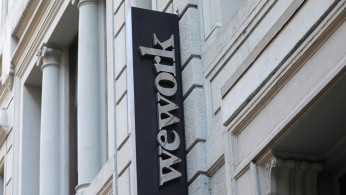Jerry Lin

The Latest
-
Roblox Misses Profit Expectations, Shares Plummet 20%
On Wednesday, Roblox, once hailed as the "Metaverse's premier stock," unveiled its second-quarter results, which fell short of expectations. The company reported a loss of $282.8 million, up from a $176.4 million loss in the same period of 2022. Earnings per share were down to -$0.46, slightly below analysts' forecast of -$0.45. 
On Wednesday, Roblox, once hailed as the "Metaverse's premier stock," unveiled its second-quarter results, which fell short of expectations. The company reported a loss of $282.8 million, up from a $176.4 million loss in the same period of 2022. Earnings per share were down to -$0.46, slightly below analysts' forecast of -$0.45. -
Beware the Wave: Bankruptcy Looms for U.S. EV Startups
U.S. electric vehicle (EV) startups that went public via Special Purpose Acquisition Companies (SPACs) were once a booming trend. However, the tides have shifted, with many of these firms either declaring bankruptcy or teetering on the brink. 
U.S. electric vehicle (EV) startups that went public via Special Purpose Acquisition Companies (SPACs) were once a booming trend. However, the tides have shifted, with many of these firms either declaring bankruptcy or teetering on the brink. -
How Japan's Central Bank Shakes the World: A Butterfly Effect Worth Hundreds of Billions
At the end of July, the Bank of Japan unexpectedly announced modifications to its yield curve control (YCC) policy, a part of its ultra-loose monetary stance in recent years. While the targeted range for 10-year Japanese government bond (JGB) yields remains at ±0.5%, the phrasing suggests this range is now merely a guideline. Additionally, the daily purchasing rate of 10-year JGBs has been increased from 0.5% to 1.0%. 
At the end of July, the Bank of Japan unexpectedly announced modifications to its yield curve control (YCC) policy, a part of its ultra-loose monetary stance in recent years. While the targeted range for 10-year Japanese government bond (JGB) yields remains at ±0.5%, the phrasing suggests this range is now merely a guideline. Additionally, the daily purchasing rate of 10-year JGBs has been increased from 0.5% to 1.0%. -
Google's Antitrust Showdown: Biggest Case in 40 Years Set for Next Month
The legacy of antitrust rulings that shaped modern capitalism has significantly influenced today's societal landscape. 
The legacy of antitrust rulings that shaped modern capitalism has significantly influenced today's societal landscape. -
WeWork's Decline Continues: 33% Stock Drop, Valuation Dips to $447 Million
Following its tumultuous journey, office space giant WeWork's fortunes continue to wane. 
Following its tumultuous journey, office space giant WeWork's fortunes continue to wane. -
Binance Triumphs in El Salvador: Secures Full Crypto License Amidst Regulatory Hurdles
In a significant stride for the cryptocurrency industry, Binance, the world's leading cryptocurrency exchange, has successfully secured a full crypto license in El Salvador. This achievement comes amidst a backdrop of increasing regulatory scrutiny and challenges faced by crypto platforms globally. 
In a significant stride for the cryptocurrency industry, Binance, the world's leading cryptocurrency exchange, has successfully secured a full crypto license in El Salvador. This achievement comes amidst a backdrop of increasing regulatory scrutiny and challenges faced by crypto platforms globally. -
NVIDIA's Vision: 'AI-Native' Set to Revolutionize Data Centers
NVIDIA's CEO, Jensen Huang, proclaimed during a Tuesday press event that the company has introduced their next-gen GH200 Grace Hopper superchip platform, specifically designed for the accelerating computing needs of the generative AI era. 
NVIDIA's CEO, Jensen Huang, proclaimed during a Tuesday press event that the company has introduced their next-gen GH200 Grace Hopper superchip platform, specifically designed for the accelerating computing needs of the generative AI era. -
WeWork Faces Doubts Over Continued Operation; Shares Plummet 30% Post-Earnings
After the closing bell on Tuesday, August 8, global co-working behemoth WeWork voiced "serious doubts" about its ability to continue operating amidst persistent losses and a stream of office space members canceling leases. The company's future, as highlighted in its financial report, largely hinges on its success in the upcoming 12 months to cut leasing costs, rein in expenses, curb capital outlays, boost revenues, and raise funds. 
After the closing bell on Tuesday, August 8, global co-working behemoth WeWork voiced "serious doubts" about its ability to continue operating amidst persistent losses and a stream of office space members canceling leases. The company's future, as highlighted in its financial report, largely hinges on its success in the upcoming 12 months to cut leasing costs, rein in expenses, curb capital outlays, boost revenues, and raise funds. -
Li Auto Surges Past 30,000 Monthly Sales, But the Real Challenge Begins Now
Despite the price war initiated by Tesla in the electric vehicle market, Li Auto, favored by the market for its product differentiation and extended-range technology, resisted the pressure to cut prices. 
Despite the price war initiated by Tesla in the electric vehicle market, Li Auto, favored by the market for its product differentiation and extended-range technology, resisted the pressure to cut prices. -
NVIDIA's Gamble on AI: CEO Jensen Huang Says 'We're Just Getting Started'
On August 8, local time, NVIDIA founder and CEO Jensen Huang, speaking at the SIGGRAPH computer graphics conference in Los Angeles, shared that the company made a pivotal business decision in 2018. A move not many realized would redefine its trajectory and help reshape a rapidly evolving industry. 
On August 8, local time, NVIDIA founder and CEO Jensen Huang, speaking at the SIGGRAPH computer graphics conference in Los Angeles, shared that the company made a pivotal business decision in 2018. A move not many realized would redefine its trajectory and help reshape a rapidly evolving industry.